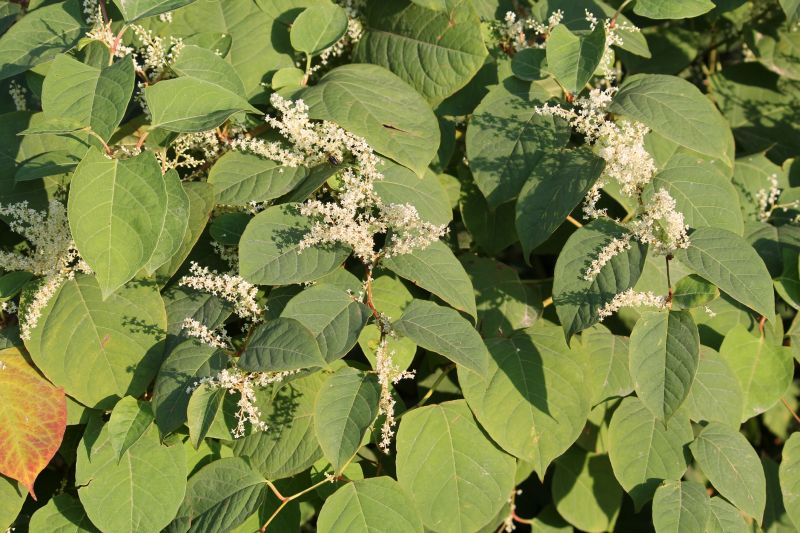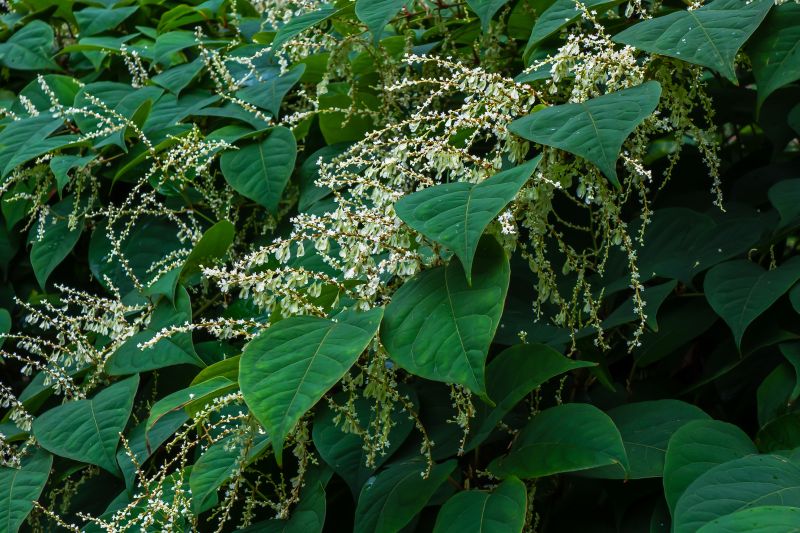Get Japanese Knotweed Removal in Danvers, MA
Japanese Knotweed removal services for property owners in Danvers, MA, help eliminate invasive plants that threaten building foundations, landscaping, and property value through specialized removal projects.
Property owners in Danvers, MA facing the challenge of Japanese Knotweed often seek reliable removal services to protect their investments and prevent potential damage. Whether preparing for property development, safeguarding landscaping, or addressing invasive growth, understanding available options can help in planning a successful project. Exploring local contractors who specialize in invasive plant removal ensures that your property receives expert attention tailored to the unique conditions of the area.
By comparing the services offered by nearby professionals, property owners can find solutions that suit their specific needs. Access to experienced service providers allows for informed decisions and confident planning, making it easier to address Japanese Knotweed effectively. Keep reading to learn more about how local specialists can assist with invasive plant management and support property preservation efforts in Danvers.
- Japanese Knotweed Removal - needed when invasive plants threaten residential or commercial properties in neighborhoods like South Danvers.
- Japanese Knotweed Removal - required when the plant begins to spread into garden beds or along fences in nearby areas.
- Japanese Knotweed Removal - necessary when overgrowth impacts structural foundations or drainage systems in local communities.
- Japanese Knotweed Removal - sought after when property owners want to prevent damage caused by aggressive root systems in the area.
- Japanese Knotweed Removal - essential when invasive growth encroaches on neighboring properties or public spaces in the region.



Japanese Knotweed removal services involve specialized techniques to identify and eliminate this invasive plant from residential or commercial properties. Trained service providers assess the extent of the infestation, often through thorough site inspections, to determine the most effective removal method. The process may include physically removing the plant, treating remaining roots with targeted herbicides, and implementing measures to prevent regrowth. Proper removal is essential to ensure the plant does not spread further or cause damage to structures, landscaping, or nearby ecosystems.
This service helps address problems caused by Japanese Knotweed, such as structural damage to foundations, walls, and drainage systems due to its aggressive growth. It can also interfere with property development plans, reduce land value, and create difficulties with mortgage or insurance approvals. For homeowners dealing with overgrown or persistent infestations, professional removal provides a practical solution to restore safety and usability to the property. Removing this invasive species promptly can also prevent it from spreading to neighboring properties, avoiding larger, more costly issues down the line.
Properties that typically require Japanese Knotweed removal include residential yards, gardens, and landscaped areas where the plant has taken hold. It is also common on commercial sites, especially those undergoing renovation or development projects. Properties near water sources, such as ponds or streams, may be particularly vulnerable, as the plant can spread easily through root fragments or seed dispersal. Landlords, property managers, and homeowners who notice rapid, dense growth of a bamboo-like plant in their yard are advised to seek professional assessment and removal services.
Anyone who notices signs of Japanese Knotweed on their property should consider consulting local contractors experienced in invasive plant removal. Early intervention can prevent extensive damage and reduce the complexity of removal efforts. Service providers can tailor solutions to the specific needs of each property, whether it involves complete eradication or ongoing management. Connecting with experienced professionals ensures the job is handled effectively, helping property owners maintain safe, healthy, and accessible outdoor spaces.
The overview below groups typical Japanese Knotweed Removal projects into broad ranges so you can see how smaller, mid-sized, and larger jobs often compare in Danvers, MA.
In many markets, a large share of routine jobs stays in the lower and middle ranges, while only a smaller percentage of projects moves into the highest bands when the work is more complex or site conditions are harder than average.
Smaller Repairs - For minor infestations or localized removal, local contractors typically charge between $250 and $600. Many routine jobs fall within this range, especially for small to medium-sized properties in Danvers, MA.
Moderate Projects - Larger areas requiring extensive removal or treatment can cost between $600 and $2,000. These projects are common for properties with moderate knotweed spread and may involve multiple sessions or methods.
Extensive Removal - Full-scale eradication of large infestations or properties with complicated access can range from $2,000 to $5,000. Such projects are less frequent but necessary for heavily affected sites or commercial properties.
Full Replacement or Complex Cases - In rare cases where invasive growth is widespread or structural removal is needed, costs can exceed $5,000. These larger, more complex projects are less common and often involve significant site work by local service providers.
Actual totals will depend on details like access to the work area, the scope of the project, and the materials selected, so use these as general starting points rather than exact figures.
Invasive Plant Removal - Professionals experienced in removing invasive plant species use similar techniques and tools to eliminate unwanted vegetation like Japanese Knotweed.
Landscape Clearance - Landscape clearing projects require knowledge of root systems and safe removal methods, which are applicable to Japanese Knotweed eradication efforts.
Excavation and Site Preparation - Excavation specialists handle soil removal and site preparation, skills that are essential when dealing with contaminated or infested areas affected by Japanese Knotweed.
Foundation and Basement Excavation - Contractors performing foundation work often encounter invasive root systems, making their expertise relevant for managing Japanese Knotweed near structures.
Storm Damage Cleanup - Storm cleanup crews are skilled in clearing debris and managing root systems, which can be useful when removing Japanese Knotweed after storm-related disturbances.
Soil Removal and Disposal - Experts in soil removal understand proper disposal techniques for contaminated or invasive plant material, aligning with Japanese Knotweed removal requirements.

When evaluating potential Japanese Knotweed removal service providers, it’s important to consider their experience with similar projects. Homeowners should look for local contractors who have a proven track record of handling knotweed removal in environments comparable to their property. Asking about the types of properties they have worked on and the complexity of past projects can help gauge their familiarity with the unique challenges involved. This insight can assist in identifying professionals who understand the specific requirements of knotweed eradication and are equipped to manage projects of varying sizes and conditions.
Clear and detailed communication is a key factor when comparing local service providers. Homeowners should seek out contractors who provide written descriptions of their services, including the scope of work, methods used, and any necessary follow-up steps. A professional approach involves transparency and the ability to answer questions thoroughly, which helps ensure expectations are aligned. Good communication also extends to how promptly and clearly a contractor responds to inquiries, as this can be indicative of their overall professionalism and dedication to customer service.
Reputable references and reviews are valuable resources when selecting a Japanese Knotweed removal specialist. While the site introduces homeowners to local options, it’s advisable to verify the quality of a contractor’s work through references or testimonials from previous clients. Homeowners can ask potential service providers for examples of completed projects or contact past clients to inquire about their experiences. This step helps confirm that the contractor has a history of satisfactory work and can be trusted to handle the job professionally. Ultimately, comparing these aspects-experience, communication, and references-can lead to a more informed decision when choosing a local contractor for knotweed removal.
Property owners in Danvers, MA use Japanese Knotweed Removal services for practical projects around their homes and businesses. This guide focuses on everyday jobs and straightforward project options.


Property owners in Danvers, MA may seek Japanese Knotweed removal services when invasive plants start to spread across their yards or near structures, causing concern about property value or potential damage. Homeowners planning to sell their property might look for professional removal to ensure their landscape remains attractive and compliant with local regulations. Additionally, those noticing rapid growth or thick patches of the plant might turn to local contractors to assess and address the issue before it worsens or affects neighboring properties.
In cases where Japanese Knotweed begins to encroach on driveways, foundations, or utility lines, property owners often need expert assistance to safely and effectively eliminate the plant. Landlords managing rental properties or residents preparing for landscaping projects might also seek out local service providers to handle removal, especially if the plant poses a risk to existing structures or future development plans. These everyday situations highlight the importance of connecting with experienced contractors who understand the challenges posed by Japanese Knotweed in the Danvers area.
What is Japanese Knotweed and why is it a problem? Japanese Knotweed is an invasive plant species that can cause damage to building foundations, walls, and underground utilities if left unmanaged.
How do local contractors typically remove Japanese Knotweed? They may use methods such as herbicide treatment, excavation, or a combination of both to effectively control and remove the plant.
Is professional removal necessary for Japanese Knotweed? Yes, because improper removal can lead to regrowth or spread, so experienced service providers are recommended for safe and thorough removal.
What should homeowners consider when choosing a Japanese Knotweed removal service? It's important to select local contractors with experience in invasive plant removal and knowledge of local regulations.
Can Japanese Knotweed be completely eradicated? With proper treatment and removal methods performed by qualified service providers, it is possible to significantly reduce or eliminate Japanese Knotweed from a property.
Property Renovation Planning - Property owners can consider Japanese Knotweed removal as part of preparing a site for landscaping or construction projects.
Garden and Landscape Maintenance - Homeowners may use removal services to eliminate invasive plants and restore garden areas for regular use.
Real Estate Transactions - Sellers or buyers can utilize local contractors to address Knotweed issues before property transactions are completed.
Land Clearing and Development - Developers might plan for Knotweed removal to ensure land is suitable for new building projects or extensions.

If you are thinking about Japanese Knotweed Removal for a property in Danvers, MA, this guide is meant to help you understand the work, the typical project types, and how different options might fit your plans.
When you are ready, you can use the quote form on this page to share a few details about your project. From there, local pros can review the basics and respond with options that match what you have in mind.



